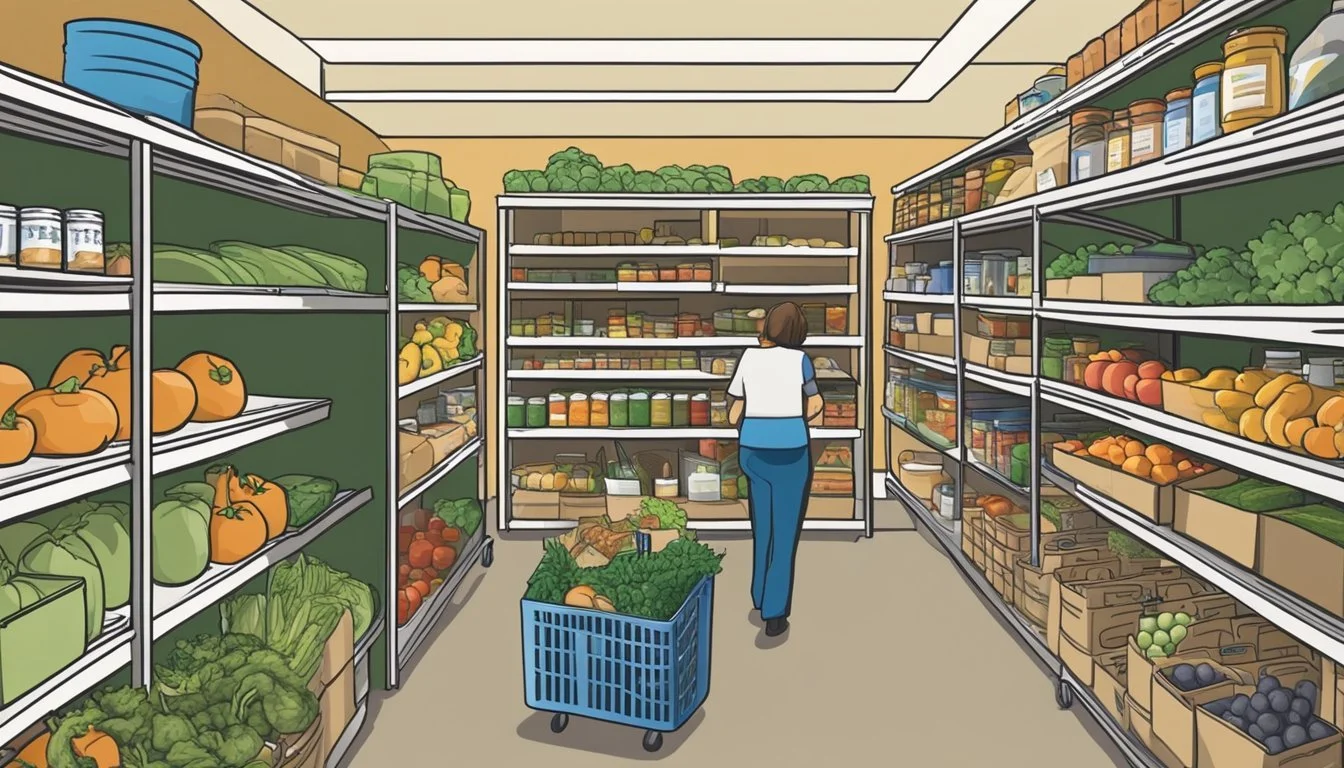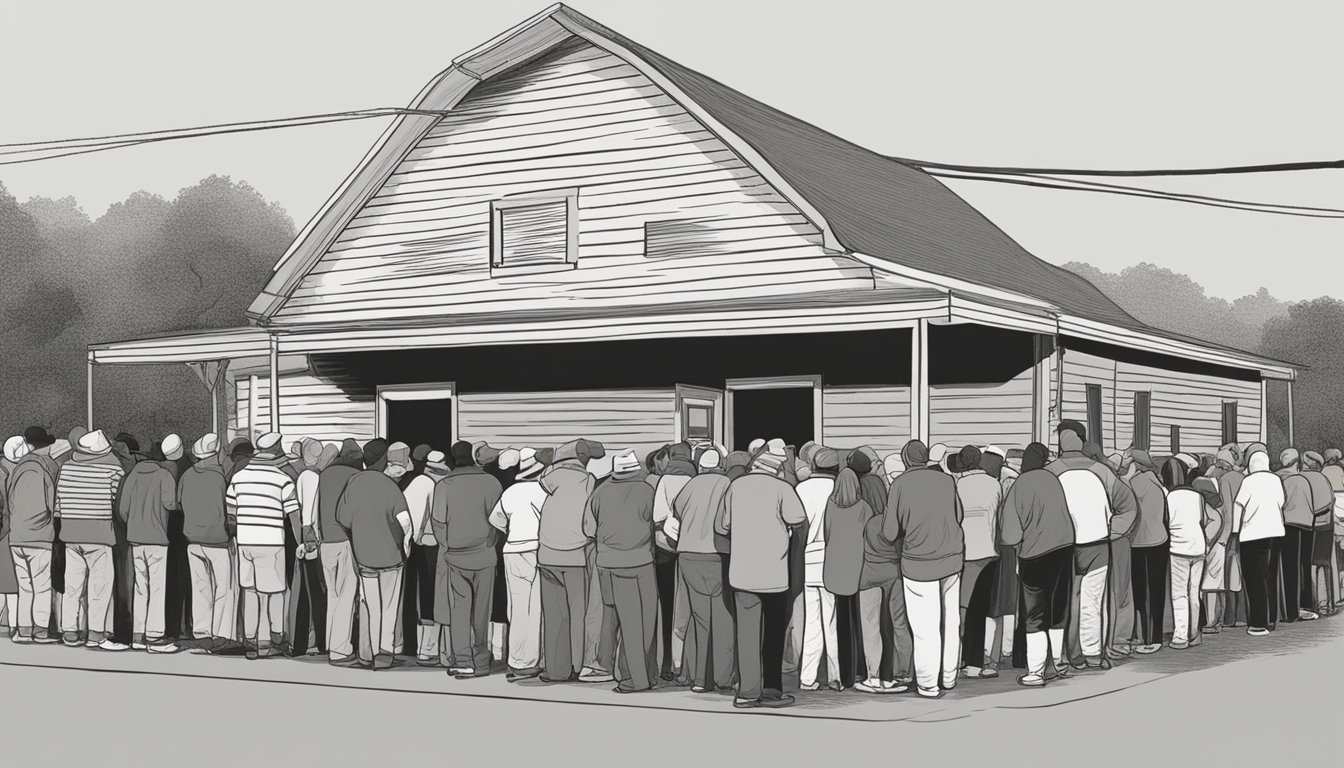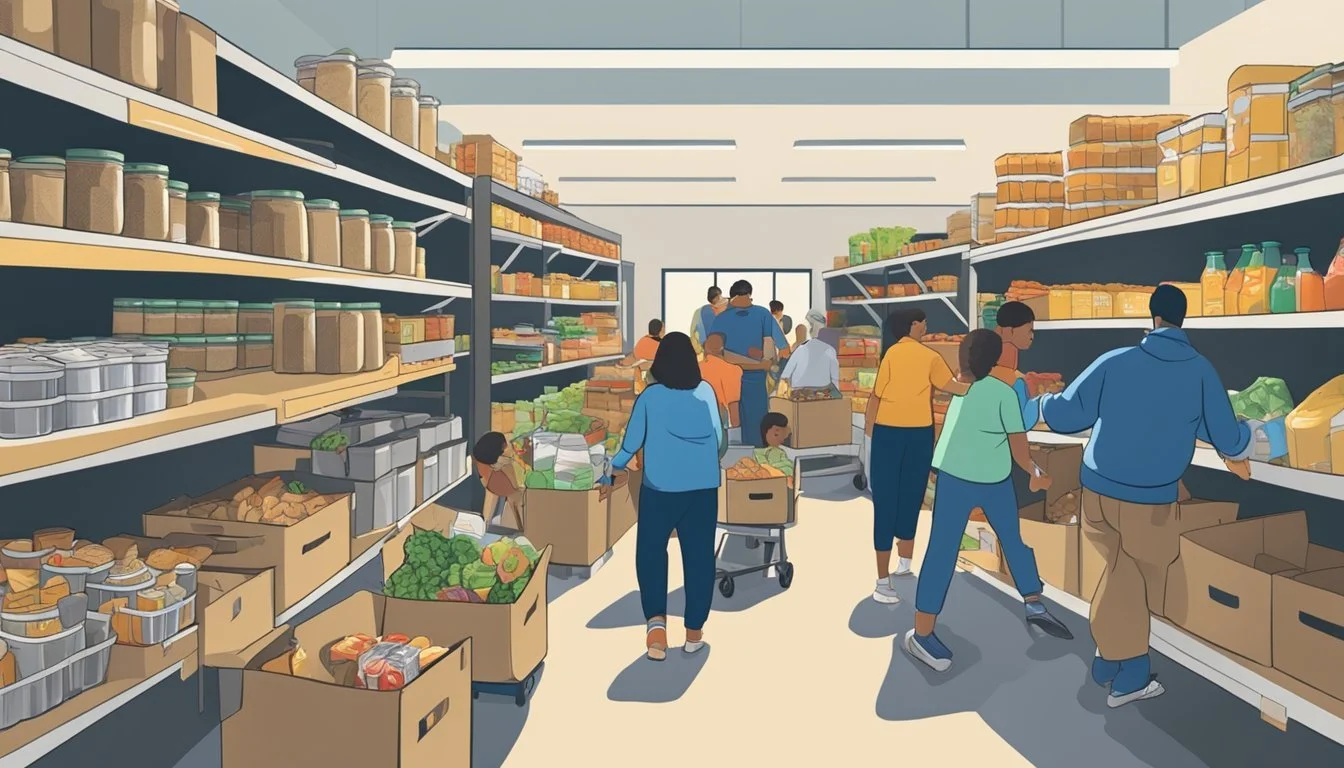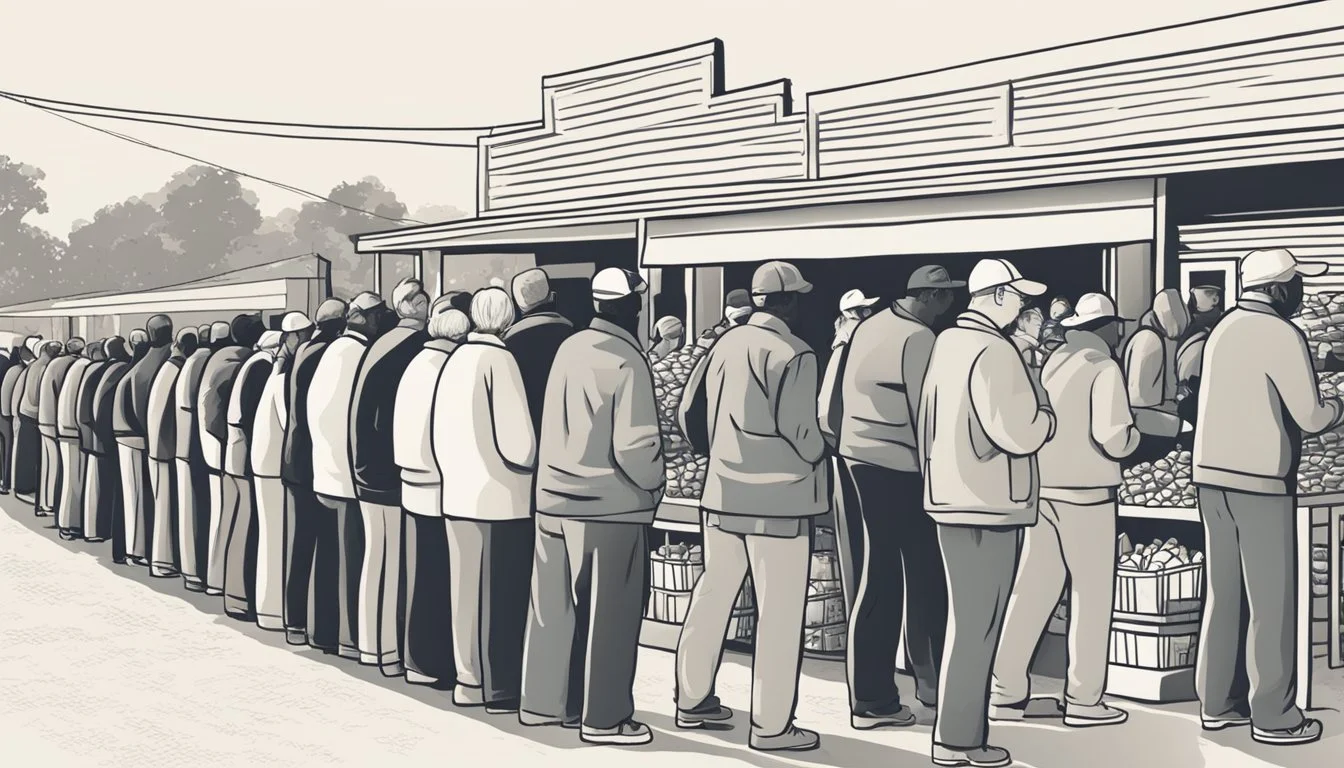Free Groceries and Food Pantries in Lynn County, Texas
Your Ultimate Guide
This Article is Part of Our Guide on Free Groceries in Texas
In Lynn County, Texas, food insecurity is an issue that residents face, as it is in many communities across the nation. To address this concern, a network of food pantries and grocery assistance programs offers support to individuals and families in need. These resources are vital in providing access to nutritious food and in promoting the overall health and well-being of the community.
Food pantries in the area, including both stationary and mobile services, ensure that emergency food assistance is available to those who find themselves in a difficult financial situation. Additionally, programs like the Supplemental Nutrition Assistance Program (SNAP) and the Special Supplemental Nutrition Program for Women, Infants, and Children (WIC) offer further support with applications and vouchers for essential food items.
Lynn County leverages partnerships with national organizations such as Feeding America to strengthen its food distribution efforts. These collaborations result in a comprehensive system that is designed to make obtaining free groceries a straightforward process. By providing a range of federal programs and local food bank information, Lynn County ensures that no resident is left without the necessary resources to secure food.
Understanding Food Insecurity
Food insecurity refers to the state where individuals or households lack consistent access to enough food for an active, healthy life. It is an issue that affects members of the community across various socio-economic backgrounds. Income disparities often contribute significantly to food insecurity, making it challenging for those with lower earnings or facing unemployment to secure adequate nutrition.
In Lynn County, Texas, certain populations such as senior citizens, children, and the elderly are particularly vulnerable. These groups may have specific dietary needs, and disruptions in their access to food can have pronounced health impacts. Community initiatives, including food pantries and free grocery distributions, seek to address these gaps in accessibility.
SNAP, the Supplemental Nutrition Assistance Program, plays a crucial role in providing food assistance. However, not all residents qualify for or have sufficient benefits to meet their needs, resulting in ongoing reliance on community-supported resources.
Data on Local Food Insecurity:
Children affected: Reliable data indicates a percentage of affected children.
Senior citizens: Studies show senior citizens often have fixed incomes that do not keep pace with the rising cost of living.
Food pantries: Food pantries, a critical resource, report a certain number of visits per year or month, attesting to the demand for their services.
A unified effort from various organizations in Lynn County aims to mitigate food insecurity by bolstering the local support systems. Through collaboration and strategic planning, these entities work to provide comprehensive nutrition support for at-risk individuals.
What Are Food Pantries?
Food pantries are local distribution centers that provide free food and groceries to people in need. They play a crucial role in the fight against hunger in communities.
Services Offered
Food pantries typically offer a variety of food items, including fresh produce, dairy, canned food, pasta, rice, and sometimes toiletries and baby supplies like diapers and baby formula. Some also provide hot meals and pet food pantries to ensure that all family members, including pets, have access to necessary provisions.
Eligibility and Documentation
To receive assistance, individuals may need to provide proof of address, ID, and documentation of income. Requirements vary by site; some pantries may use a self-declaration form for income verification to ease the process for clients.
How to Find a Local Pantry
Local food pantries can be found by searching online, asking for referrals from community organizations, or using tools provided by networks like Feeding America. To locate a pantry, individuals should enter their state and zip code into food bank websites, which will provide a list of nearby locations and hours of operation.
Volunteering and Donations
Most pantries rely on volunteers and donations from the community to operate. They welcome help in the form of physical labor, food donations, or financial support. Contact information for volunteering is usually available on the pantry's website or by calling directly.
Additional Services and Programs
In addition to their primary role, some pantries offer drive-thru pantry services for convenient pick-up, mobile food pantry distributions, and participate in SNAP and USDA commodities programs. Pantries may collaborate with food banks such as the Tarrant Area Food Bank or the Southeast Texas Food Bank to provide a broader range of services.
Maximizing the Use of Food Pantries
Food pantries in Lynn County, Texas, serve as crucial nodes in the fight against food insecurity by providing free groceries to the community. To optimize their use, it's important for both visitors and the community to understand how to best access and support these resources.
Planning Your Visit
Visitors should check the hours of operation and locations of food pantries in Lynn County. Most pantries have set distribution times, and some may offer drive-thru pantry services for added convenience. A list of pantry schedules can typically be found on local charity websites, at community centers, or by contacting the pantry directly.
What to Expect During Distribution
Upon arrival, expect to wait in line; some locations may be busier than others, depending on the day. Food distribution is often organized, with volunteers placing bags of food, dairy, and fresh produce directly into your trunk. Occasionally, hot meals may also be provided. It is advisable to arrive with enough space in your vehicle to accommodate the groceries.
Nutrition and Health Considerations
Many food pantries strive to offer groceries with high nutritional value, including vegetables, fruits, and USDA commodities. Pantries often partner with organizations like Feeding America to ensure a variety of healthy options is available.
Community Support and Networks
Food pantries function best with strong community support. They are part of a larger network that includes charities and local businesses. Engaging in food drives or volunteering time can strengthen these networks and ensure consistent food distribution to those in need.
Overcoming Stigma and Building Community Trust
Breaking down barriers is vital for maximizing the effectiveness of food pantries. Overcoming stigma around receiving free food can be achieved through education and by fostering a welcoming environment. Building trust within the community encourages a robust support system that benefits all members facing food insecurity.
Other Resources for Food Assistance
In Lynn County, Texas, residents who struggle with food insecurity can access numerous resources beyond local food pantries. These include a mix of government programs, charitable organizations, and community-led initiatives tailored to offer support to various groups including senior citizens, children, and the elderly.
Government Programs
SNAP (Supplemental Nutrition Assistance Program), commonly referred to as food stamps, is a federal assistance program that provides eligible individuals and families with an EBT card to purchase groceries. Additionally, the USDA Commodities Program offers a variety of federally-purchased foods to those in need.
SNAP: Application through local SNAP offices or online.
USDA Commodities: Distributed through approved local agencies.
Charitable Organizations
Feeding America operates a nationwide network of food banks and is linked with local charities in Lynn County to distribute food. The Salvation Army also frequently offers grocery assistance and meal programs through its local chapters.
Feeding America: Connects people with nearest food banks.
The Salvation Army: Provides food assistance and meal services.
Religious and Community Initiatives
Many churches and religious groups run soup kitchens and food drives, providing meals and groceries with no questions asked. Community centers may host events like mobile food pantries that bring food directly to those who cannot travel to a pantry.
Churches: Often hold regular food distribution events.
Mobile Food Pantry: Schedule and locations vary per community.
Specialized Support Services
There are services specifically designed for senior citizens and children. These may include programs like Meals on Wheels, which delivers food to the elderly or disabled, and school-based initiatives ensuring children have access to nutritious meals.
Senior Support: Include delivery services like Meals on Wheels.
Children's Programs: Free or reduced-price school meals and after-school snack programs.
COVID-19 and Its Impact on Food Access
The coronavirus pandemic has sharply accentuated food insecurity in Lynn County, Texas, like many other regions. Food distribution channels faced monumental disruptions. Lockdowns, job losses, and health fears significantly hampered residents' access to food. Food insecurity, which denotes limited or uncertain access to nutritious food, saw an unwelcome rise.
Food pantries played a crucial part in bolstering food access. They adapted swiftly, bolstering their operations to meet the increased demand. With more individuals seeking assistance, pantries extended their services to fill in the gaps left by conventional food supply chains.
Increased demand: Pantries witnessed a surge in visitor numbers as financial strain gripped many households.
Adapted services: With safety as a priority, food pantries implemented new distribution models, such as curbside pickups or delivery services.
Supply chain challenges: Pantries grappled with inconsistent food supplies due to halts in production and transportation.
Throughout the crisis, these community lifelines confirmed the vital role they play. They not only cushioned against the immediate blows of the pandemic but also underscored the broader, ongoing battle against food insecurity. Lynn County's experience highlighted the interdependence of public health, economic stability, and food access systems.
Despite the pressing challenges, the resilience and adaptability of food distribution networks, especially through pantries, showcased a determined response to COVID-19's severe impact on food access.
Future of Food Banks and Pantries in Texas
Food banks and pantries across Texas are grappling with challenges that could shape their operations in the coming years. The demand for free groceries and assistance from food pantries continues to be significant in various communities, including Lynn County. These organizations are key components in the state's fight against hunger.
Statewide Initiatives: The state of Texas, in collaboration with entities like Feeding America, is working to improve the food security network. Efforts are aimed at increasing the efficiency of food banks and expanding the reach of food pantries, to ensure that fewer Texans go hungry.
Legislative Support: With new policies under consideration, Texas lawmakers have the opportunity to positively impact food assistance programs and address issues such as college hunger.
Partnerships: The success of food banks often depends on a network of partnerships including local charities, community centers, and statewide food bank associations. Strengthening these partnerships can maximize distribution capabilities.
Technological Advancements: Anticipation of advancements in technology also points toward a more streamlined operation within food banks and pantries. This includes better inventory management systems and improved logistics for food distribution.
Local Support: Community involvement in Lynn County and surrounding areas continues to be vital. Volunteers and local donations are the lifeblood of pantries and food banks, indicating a continued reliance on local support systems for future operations.
In summary, Texas food banks and pantries are likely to evolve through legislative actions, technological improvements, and strengthened community support, ensuring resilience in the face of future challenges.
Conclusion
Food banks and pantries in Lynn County, Texas, represent critical resources for residents facing food insecurity. These institutions mobilize community efforts and volunteer support to provide no-cost groceries, effectively addressing the immediate nutritional needs of the local population.
Local food banks have adapted to increase accessibility, even following the changes instilled after the COVID-19 public health emergency. They are equipped with various federal programs aid individuals and families.
Food pantries operating within the community, such as St. Stephen's Food Pantry, have dedicated contact lines, ensuring clear communication for those seeking assistance. They typically require visitors to provide some basic information to tailor the support to each household's unique needs.
Drive-Thru Pantries:
Drive up for assistance
Quick check-in process
Pre-packaged food loaded into vehicles
Volunteers are the backbone of these programs, guiding beneficiaries through the process, from the initial point of contact to the final distribution of food items. They not only contribute their time but also help raise awareness about hunger and poverty in Lynn County.
The Food Group, although not based in Lynn County, serves as an inspiration for innovative solutions to food assistance, providing low-cost groceries and emphasizing fresh produce accessibility.
In conclusion, food assistance programs in Lynn County work tirelessly to support community members, ensuring that individuals facing economic hardships have one less worry on their minds: where their next meal will come from.







